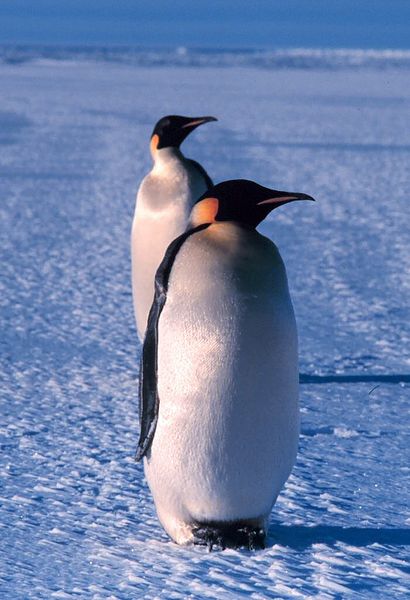 Geologist Dr. Sebastian Lüning’s and Prof. Fritz Vahrenholt’s Die kalte Sonne website talks about the latest study on Antarctic ice. Remember that we keep hearing that the next IPCC report will be even scarier than the last one of 2007.
Geologist Dr. Sebastian Lüning’s and Prof. Fritz Vahrenholt’s Die kalte Sonne website talks about the latest study on Antarctic ice. Remember that we keep hearing that the next IPCC report will be even scarier than the last one of 2007.
========================
Antarctic Ice Sheet Indeed Melting Slower Than Originally Thought
By Fritz Vahrenholt and Sebastian Lüning (translated, edited by P Gosselin)
We often read that the ice caps are melting faster than ever and that sea level rise has accelerated over the last decades. It is feared that sea level could be 2 mters higher by the year 2100. It is true that a majority of water stored on land as ice is located in the Antarctic ice sheet. If it melted completely, sea level would rise 60-65 m.
Luckily today we have satellites to permanently monitor the ice caps on Earth. And so far over the years, we have collected a good amount of data. Indeed it is only necessary to measure in detail the height of the ice cap over the continent and then automatically compute an ice volume. From the change, one could then calculate the melt rate.
But things aren’t quite that easy. When the last ice age ended 12,000 years ago, part of the Antarctic ice thawed. This reduced the load on the continent and thus allowed it to rise like an unloaded cargo ship – a process that is still taking place today. This is called glacial isostatic adjustment (GIA). This value itself is not easy to determine. The uncertainty here is estimated to be 50-150 billion tons per year (gigatons/year). That’s no chicken feed – especially if you consider that the melt rate assumed so far is only 26 gigatons per year. Here we see that the uncertainty is multiple times more than the actual data signal itself. That hardly induces much confidence in the results.
An international research team led by Erik Ivins of the Jet Propulsion Lab of Pasadena, California has taken a closer look at the GIA-correction and has reworked the data. They just recently published the results in the Journal of Geophysical Research. Based on data of the last decade, they’ve determined that the Antarctic ice melt represents in the worst case an amount of o.16 mm/year in terms of global sea level rise. That is signficantly less than what the IPCC proposed in its 2007 climate report. Back then the IPCC propoosed a sea level rise contribution by Antarctica in the worst case of 0.56 mm per year, see Table SPM1 of IPCC AR4).
==========================================
Photo credit: NOAA, public domain.





How can it be melting 70% more slowly whane it’s expanding. What a clown.
The sea ice is expanding; the ice sheet is the land ice. It is the ice sheet that is allegedly losing mass.
But as Lünning and Vahrenholt püoint out, it’s more a wild-ass guess with great uncertainty. Ice mass could well be growing, and not shrinking.
We can expect a new UBA pamphlet any day now: “Und sie schmiltzt doch”.
If someone says that he earns 70 percent less than he had hoped, this is not very informative, the more because it is based on a wrong number. OK, at most 0.16 mm/year sea level rise.
0.16 is roughly 70% less than the IPCC 2007 estimate of 0.56.
Nice penguin photo there. It’s actually worse than we thought.
Head off to the high ground. Save yourselves. 🙁
OK! Now we have it. It’s all of those little black bodies that is melting the ice!
Hi, Dirk H.! Jimbo from over at WUWT today posted a link to this site — EXCELLENT work, here, Mr. Gosselin.
I recalled the following comment from a recent WUWT thread. Hope you find it helpful. I certainly have no science knowledge of my own creation to share!
“Chris R. says:
June 14, 2013 at 11:37 am
So, the Antarctic ice sheet is losing mass, faster and faster, WE’RE DOOMED!
Uh huh.
In 2011, Zwally and Giovinetto published the paper “Overview and assessment of Antarctic Ice-Sheet mass balance estimates: 1992-2009.” Surveys in Geophysics 32: 351-357. These are two NASA scientists. They examined a number of estimates of ice mass balance for the Antarctic. They stated that their preferred estimate was -31 Gt/year. Less than 3% of the annual mass input, and about 0.2 mm of “sea-level equivalent” per year. Also, some of the surface mass balance estimates were in fact POSITIVE, including from the EU’s ERS satellite (+28 Gt/year). The very high negative values were from GRACE data, which has been demonstrated to have very high errors.
The fact is, we don’t even know if Antarctica is actually losing ice mass at all, 31 gigatonnes of ice sounds like a lot, per year–but with ice having a density of 917 kilograms/cubic METER, it amounts to less than 1 cubic kilometer per year! That’s a pretty finicky estimate for an ice sheet that contains 26.5 million cubic km of ice!”
[link for WUWT comment above: http://wattsupwiththat.com/2013/06/13/game-changer-antarctic-melt-due-to-warm-water-not-air-temperature/#more-88085%5D
Hi Janice.
You discovered our secret lair here in Germany.
Hm, I don’t know what Chris R did there, but 1 gigaton of ice is roughly one cubic kilometer. The metric system is simple in this regard.
Didn’t Icesat show that ice gains exceed losses in Antarctica?
http://wattsupwiththat.com/2012/09/10/icesat-data-shows-mass-gains-of-the-antarctic-ice-sheet-exceed-losses/
“Sulfate aerosols cool climate less than assumed”
http://www.mpic.de/en/press/press-information/max-planck-institute-for-chemistry-broadens-network-to-india/sulfate-aerosols-cool-climate-less-than-assumed.html
Um, 0.16mm/yr means 16 mm/century. About 3/4″. Be sure to run for the 1″ hills to escape it.
Oops, I meant to say 2/3″ /century. Crisis avoided.